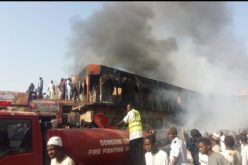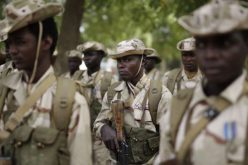BBC News – Nigeria’s fuel wholesalers say they have reached a deal with the government that should soon see the end of the crippling fuel crisis.
The agreement was reached after talks with the finance minister, Danladi Fasali from the Independent Petroleum Marketers Association told the BBC.
The wholesalers had stopped distributing fuel after alleging the government owed them $1bn (£625m).
The shortage has had an impact on the country’s aviation and banking sectors.
The party of President-elect Muhammadu Buhari, who is due to take office on Friday, had accused the outgoing government of “sabotage” for failing to deal with the crisis.
At the heart of the shortage has been a row over the payment to wholesalers of the difference between the subsidised pump price and the international market price.
The wholesalers say they were waiting for a $1bn payout from the government before they released more fuel.
But now the marketers association has told its members to start transporting fuel from the depots in the commercial capital, Lagos, and fuel stations have been instructed to reopen, Mr Fasali told the BBC Hausa Service.
A committee will now be set up to verify the $1bn figure and then pay the outstanding money. The government has not yet confirmed the details.
It appears the fuel importers and marketers who operate a multi-billion dollar scam have blackmailed the government into agreeing to one more payout as they are not sure how much longer the fuel subsidy racket will go on.
The details of the payout are not clear.
Over the last few weeks, they literally shut down the nation saying they were owed $1bn in arrears, but no-one has yet seen how that figure is worked out.
Many government officials, including employees of the state fuel company, are so intertwined in the fraud it is hard to know who is scamming who.
One thing is clear. Nigerians across the country trying to earn a living to feed their families are facing a new level of hardship.
When it comes to the fuel sector the incoming president is inheriting one hell of a corrupt mess.
Most Nigerian businesses and homes rely on diesel-powered generators because of the poor electricity infrastructure.
On Monday, some of the country’s leading banks introduced shortened branch opening hours.
Three of the country’s mobile phone companies, MTN, Airtel and Etisalat, warned that the fuel scarcity could affect their services as they were finding it difficult to supply diesel to the base stations.
Many domestic flights have been cancelled and some international flights have been landing in neighbouring countries to refuel.
Traffic on the roads has also reduced as many fuel stations have stopped selling petrol and there are long queues at places where petrol is available.
It is not clear how quickly the fuel will now reach the petrol stations and queues are likely to remain for the next day or two, our correspondent says.











